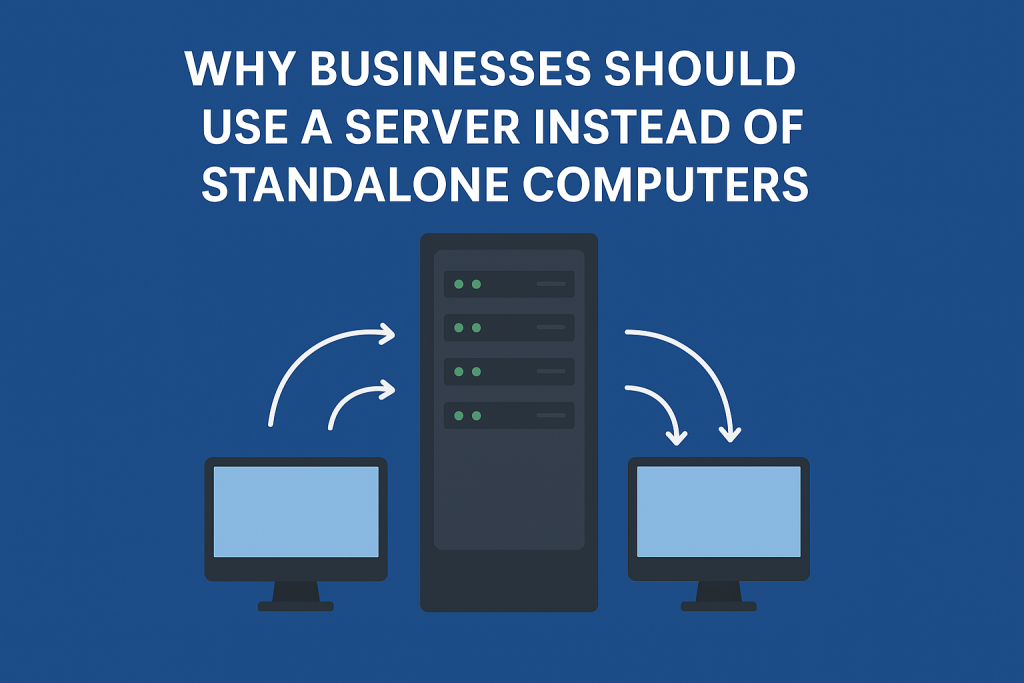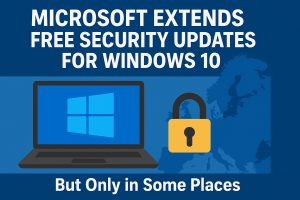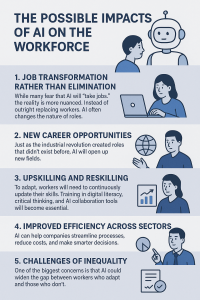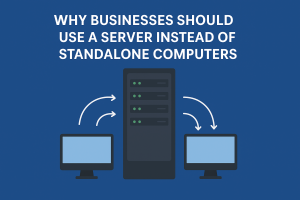In today’s fast-paced digital world, many small and medium-sized businesses still rely on standalone computers to run their daily operations. While this setup might seem simple and cost-effective at first, it often creates challenges as a business grows. Moving to a server-based environment offers significant advantages in terms of performance, security, and scalability.
- Centralized Data Management
With standalone computers, files are scattered across different machines, making it difficult to keep track of important documents or ensure that everyone is working with the latest version. A server provides a central hub where all company data can be stored, managed, and backed up. This reduces duplication, avoids version conflicts, and makes collaboration far more efficient.
- Improved Security
Standalone computers often rely on local security measures, which can leave gaps if one machine isn’t properly updated or protected. Servers allow businesses to enforce consistent security policies across the entire network. Features like access controls, permissions, and centralized antivirus software ensure sensitive data is safeguarded. In the event of a hardware failure or cyberattack, server-based backups can restore critical files quickly.
- Enhanced Collaboration and Productivity
Servers make it easy for teams to share resources, communicate, and collaborate in real time. Whether it’s sharing files, running a company-wide database, or hosting shared applications, a server ensures everyone has access to the tools they need—without relying on emails or USB drives.
- Scalability and Growth
As your business expands, so do your IT needs. Standalone computers can quickly become inefficient when multiple employees require access to the same resources. Servers are designed to scale—adding users, increasing storage, or deploying new applications can all be done without overhauling your entire IT system.
- Cost Efficiency in the Long Run
While purchasing a server might seem like a larger upfront investment, it often saves money in the long term. Reduced downtime, improved employee productivity, and lower risk of data loss all contribute to cost savings. Plus, centralized management means IT staff can handle updates and maintenance more efficiently, lowering support costs.
- Support for Remote and Hybrid Work
With more businesses adopting remote and hybrid working models, servers play a crucial role in providing secure remote access. Employees can log in from anywhere and still have access to the same files, applications, and systems as they would in the office—without compromising security.
Final Thoughts
Relying on standalone computers might work for a very small business, but as soon as collaboration, data security, or growth becomes a priority, servers are the smarter choice. They provide a robust foundation for business operations, reduce risks, and set the stage for future scalability.
If you’re still running your business on standalone PCs, now is the time to consider making the switch to a server-based setup. The benefits far outweigh the initial investment, giving your business the tools it needs to thrive in the digital age.






